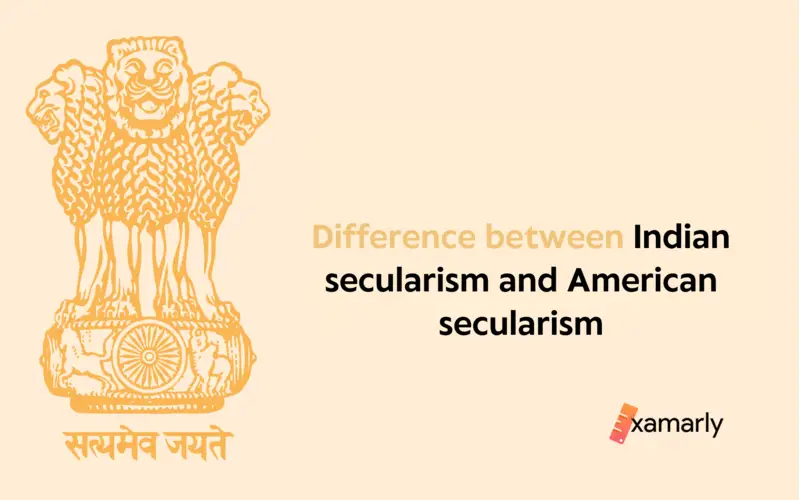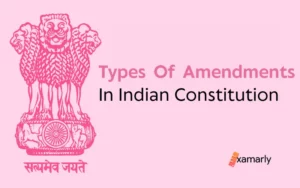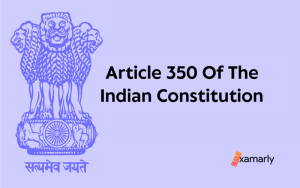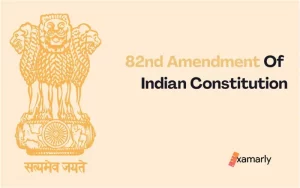Introduction
In this article, we will reflect on the difference between Indian secularism and American secularism. We will explore the history and evolution of secularism, examining its origins, its principles, and its current state in different parts of the world.
We will also discuss some of the key challenges and criticisms that have been levelled against secularism, and consider its potential impact on society and politics in the future.
Secularism is a complex and multi-faceted concept that has been the subject of much debate and discussion in recent years.
At its core, secularism is the belief that government and society should be separate from religious influence and that individuals should be free to practice their own religion without interference.
- Introduction
- The Origins of Secularism
- The Principles of Secularism
- The Current State of Secularism
- Indian Secularism – An Overview
- American Secularism – An Overview
- Differences Between Indian and American Secularism
- The Future of Secularism
- Summing Up
- FAQs
- Q: What is secularism?
- Q: What is the difference between secularism and atheism?
- Q: Why is secularism important?
- Q: How is secularism practised in different countries?
- Q: What are some criticisms of secularism?
- Q: How does secularism relate to democracy?
- Q: What is Indian Secularism?
- Q: How is Indian Secularism different from Western Secularism?
- Q: How is Indian Secularism practised?
- Q: What are the criticisms of Indian Secularism?
- Q: How does Indian Secularism relate to democracy?
- Q: How does Indian Secularism relate to the Indian Constitution?
The Origins of Secularism
Secularism is a term that has been used to describe a wide range of political and social movements and ideologies.
At its most basic level, secularism is the belief that government and society should be separate from religious influence.
This separation of religion and state is often seen as a cornerstone of modern democracy and is considered essential for protecting individual freedom and human rights.
The origins of secularism can be traced back to the Enlightenment, a period of intellectual and cultural change in Europe that began in the late 17th century.
During the Enlightenment, philosophers and thinkers began to question traditional religious and political authority and to advocate for the use of reason and science to understand the world.
This led to the development of new ideas about the nature of society and government, and to the emergence of the modern secular state.
The Principles of Secularism
The principles of secularism are often defined in terms of the separation of religion and state. This separation is typically seen as necessary for protecting individual freedom of religion and for ensuring that the government is not influenced by religious interests.
Additionally, secularism is often associated with the belief in the importance of reason, science, and critical thinking.
One of the key principles of secularism is the idea that all individuals have the right to practice their own religion without interference.
This means that the government and society should be neutral in matters of religion, and should not impose any particular religion on its citizens.
Additionally, secularism is often associated with the belief that all individuals should be treated equally, regardless of their religion or belief.
The Current State of Secularism
Secularism is a concept that is often associated with the Western world, particularly Europe and North America.
However, secularism is a global phenomenon that can be found in many different parts of the world.
In some countries, such as France and Turkey, the government is strongly secular and actively promotes the separation of religion and state.
In other countries, such as India and the United States, the government is more loosely secular, and religion plays a significant role in public life.
Despite the global spread of secularism, the concept remains the subject of much debate and criticism.
Some argue that secularism is a form of cultural imperialism, imposed on non-Western societies by Western powers.
Others argue that secularism is a threat to traditional values and cultural heritage. Additionally, some critics argue that secularism has led to the erosion of moral and social values, and has contributed to the rise of individualism and consumerism.
You Might Also Like – Difference Between Communism And Communalism
Indian Secularism – An Overview
Secularism in India is a complex and sometimes controversial topic. India is a secular democracy, with a constitutional commitment to religious neutrality.
However, in practice, some argue that the government has favoured certain religious groups and that there have been instances of discrimination and violence against minority communities.
Additionally, there have been instances where political leaders have used religious rhetoric for their own gain, further complicating the relationship between religion and government in India.
American Secularism – An Overview
Secularism in America is also a complex and sometimes controversial topic. The United States is a secular nation, with a constitutional separation of church and state.
However, religion plays a significant role in American society and politics, and there are ongoing debates about the proper relationship between religion and government.
Some argue that the government should be completely secular and neutral on religious matters, while others argue that religious values should inform government policy.
Additionally, there have been instances where political leaders have used religious rhetoric for their own gain, further complicating the relationship between religion and government in the United States.
Differences Between Indian and American Secularism
| Feature | Indian Secularism | American Secularism |
|---|---|---|
| Constitutional Basis | The constitutional commitment to religious neutrality. | Separation of church and state. |
| Historical Development | India has a long history of religious diversity, and secularism has been an important principle in the country’s political development. | Secularism in America is rooted in the country’s founding documents and has been reinforced by court decisions over time. |
| Current Status | In practice, some argue that the government has favoured certain religious groups and that there have been instances of discrimination and violence against minority communities. | Religion plays a significant role in American society and politics, and there are ongoing debates about the proper relationship between religion and government. |
| Political Rhetoric | Political leaders have been known to use religious rhetoric for their own gain. | Political leaders have been known to use religious rhetoric for their own gain. |
| Role of Religion in Government | Religion has a limited role in government, and the government should be neutral in religious matters. | Religion has a limited role in government, but religious values may inform government policy. |
| State-Religion Interference | Government interference in religious matters is minimal | Government interference in religious matters is minimal but with a legal framework that allows the court to take necessary actions. |
| Legal framework | India has laws and policies that prevent discrimination on the grounds of religion | America has laws and policies that prevent discrimination on the grounds of religion, but the interpretation and implementation of these laws may differ. |
| Religious Diversity | India has a wide range of religions and religious minorities, which creates unique challenges for secularism. | America has a diverse religious population, but Christianity is the dominant religion. |
| Religious Education | The government does not provide religious education. | Public schools are not allowed to provide religious education, but private religious schools may receive state funding. |
| Religious Symbols | Government buildings and institutions do not display religious symbols. | Government buildings and institutions may display religious symbols, but this is restricted by the First Amendment. |
| Religious Accommodation | India has laws and policies that provide for religious accommodation in certain situations. | America has laws and policies that provide for religious accommodation in certain situations, but the interpretation and implementation of these laws may differ. |
| Religious freedom | India has laws and policies that protect religious freedom, but there have been instances of infringement. | America has laws and policies that protect religious freedom, but there have been controversies over the interpretation and implementation of these laws. |
| Government funding for religious institutions | Government funding for religious institutions is limited in India | Government funding for religious institutions is limited in America but sometimes can be provided in form of tax exemptions. |
| Political representation | Political representation of religious minorities is limited in India. | Political representation of religious minorities is limited in America but with an open and competitive political system, minority groups are able to participate in politics. |
| Religious Demography | India has a large Hindu majority with significant Muslim, Christian, Sikh and Buddhist minorities. | America has a mostly Christian population, with significant Jewish, Muslim, Hindu and Buddhist minorities. |
The Future of Secularism
As the world becomes increasingly interconnected, the question of secularism is likely to become increasingly important.
Many experts predict that secularism will continue to spread to other parts of the world, as more and more people reject traditional religious and political authority.
However, it is also possible that secularism will face increasing resistance, as traditional values and cultures come under threat.
One thing is certain, the future of secularism is likely to be shaped by the ongoing debate and discussion about the role of religion in society and government.
As more and more individuals, organizations and governments adopt secularism as an ideology, it will be important for them to consider the implications of these decisions on the rights and freedoms of individuals and groups that hold different beliefs.
One potential future of secularism is the development of a more inclusive and tolerant society. As secularism becomes more widely accepted and practised, it may lead to greater acceptance and understanding of people of different backgrounds, cultures and religions.
This could help to reduce tensions and conflicts between different groups and promote a more peaceful and harmonious society.
However, there are also concerns that secularism could lead to increased polarization and division, as those who hold traditional or religious beliefs feel marginalized and excluded.
It will be important for governments and societies to find ways to balance the principles of secularism with the need to respect and protect the rights and freedoms of all individuals.
Summing Up
In conclusion, secularism is a complex and multi-faceted concept that is likely to continue to evolve and shape the political and social landscape in the future.
While it has the potential to promote greater tolerance, understanding and peace, it will also be important for governments and societies to consider the implications of secularism for the rights and freedoms of individuals and groups that hold different beliefs.
It will be a delicate balancing act to preserve the principles of secularism and protect the rights of all individuals.
FAQs
Q: What is secularism?
A: Secularism is a principle or belief that the state or government should be neutral and not favour one religion over others, or promote or inhibit religion in general. It can also refer to the separation of church and state, where the government does not interfere in religious matters and vice versa.
Q: What is the difference between secularism and atheism?
A: Secularism refers to the relationship between religion and government, while atheism refers to a lack of belief in a god or gods. A person can be secular without being an atheist, and vice versa.
Q: Why is secularism important?
A: Secularism is important because it helps to ensure that everyone has the freedom to practice their own religion, or no religion at all, without fear of discrimination or persecution. It also helps to prevent the government from favouring one religion over others and promotes a society where people of different religions can live together peacefully.
Q: How is secularism practised in different countries?
A: The practice of secularism varies from country to country. In some countries, such as France, the government is strictly secular and does not allow for religious symbols in public spaces. In other countries, such as the United States, the government is secular but allows for religious expression in certain contexts.
Q: What are some criticisms of secularism?
A: Some criticisms of secularism include that it can be used as a tool to suppress religious expression and that it can be used to justify discrimination against religious minorities. There are also concerns that strict secularism can lead to a society where religious values and traditions are not valued or passed on to future generations.
Q: How does secularism relate to democracy?
A: Secularism and democracy are often closely related. A secular government allows for the free and fair expression of different opinions and beliefs, which is a fundamental aspect of democracy. A secular state also helps to ensure that minority groups, including religious minorities, are protected and have the same rights and opportunities as the majority.
Q: What is Indian Secularism?
A: Indian Secularism is the principle or belief that the Indian state or government should be neutral and not favour one religion over others, or promote or inhibit religion in general. It is also known as “Sarva Dharma Sambhava” which means equal respect for all religions.
Q: How is Indian Secularism different from Western Secularism?
A: Indian Secularism is different from Western Secularism in that it recognizes and respects the diversity of religions and cultures within India, rather than promoting a strict separation between religion and state.
Q: How is Indian Secularism practised?
A: Indian Secularism is practised by the government providing equal opportunities and protections to all religious groups, while also promoting tolerance and respect for diversity. The government also provides certain privileges to religious and linguistic minorities.
Q: What are the criticisms of Indian Secularism?
A: Some criticisms of Indian Secularism include that it is not always implemented consistently and that it is sometimes used as a tool to suppress religious minorities. There have also been concerns that secularism in India is being used as a tool for political gain.
Q: How does Indian Secularism relate to democracy?
A: Indian Secularism is closely related to democracy in India. A secular government allows for the free and fair expression of different opinions and beliefs, which is a fundamental aspect of democracy. A secular state also helps to ensure that minority groups, including religious minorities, are protected and have the same rights and opportunities as the majority.
Q: How does Indian Secularism relate to the Indian Constitution?
A: Indian Secularism is an important principle that is reflected in the Indian Constitution. The Constitution guarantees the right to freedom of religion and prohibits discrimination on the grounds of religion. It also provides for certain privileges to religious and linguistic minorities.






